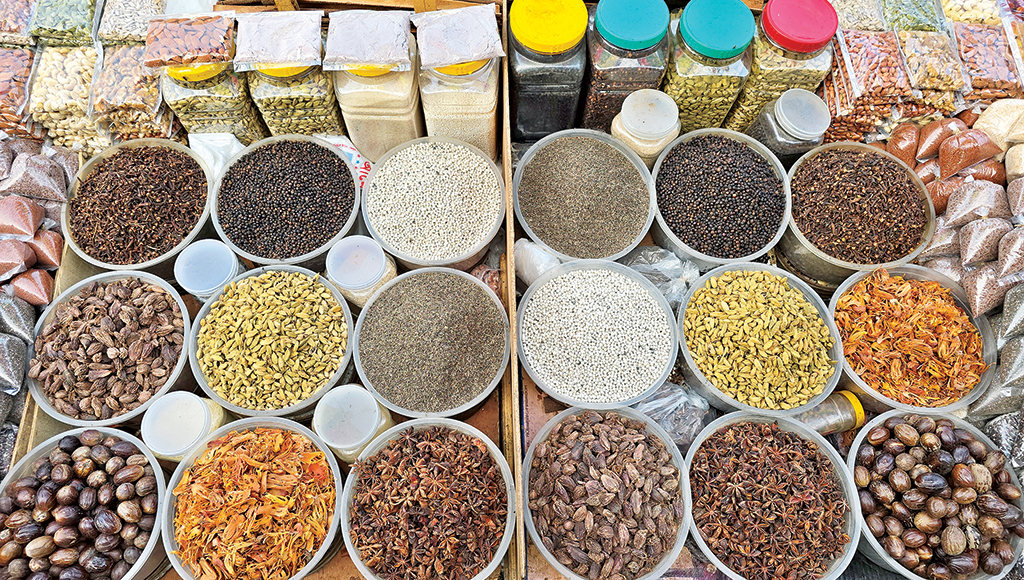
After a year marked by inflationary pressure on key food commodities and various types of spices, the Bangladeshi market is witnessing a notable decline in the prices of several essential spices, a relief for consumers ahead of Eid-ul-Azha.
Eid-ul-Azha, one of the biggest religious festivals of the Muslims, is expected to be held in the first of week of June.
According to data from Khatunganj wholesale market, the prices of major kitchen staples like ginger, garlic, and imported aromatic spices such as cumin and cinnamon have dropped significantly compared with the past year.
Traders attribute the decline to sufficient domestic supply, declining international booking rates, and stable import conditions.
According to the Trading Corporation of Bangladesh, as of May 17, locally produced onions were retailing between Tk 48–60 a kilogram, down from Tk 65–75 a month earlier.
Imported onions also steeply declined, trading at Tk 60–65 a kilogram compared with Tk 80–85.
Ginger prices spiked past year to Tk 400–450 a kilogram for local varieties and Tk 200–250 for imported ones, but they have now eased to Tk 110–250 and Tk 110–220, respectively.
Similarly, garlic — once priced at Tk 190–210 a kilogram for domestic produce and Tk 210–240 for imported one — now sells for Tk 100–160 (local) and Tk 170–240 (imported).
Dry spices, including turmeric, dry chili, cumin, and cinnamon, also follow a similar downward trend.
On the wholesale market, prices of these commodities have dropped sharply over the past month, creating expectations for further reductions in retail rates as Eid approaches.
Amar Kanti Das, vice-president of the Bangladesh Spices Traders Association, said that the prices of major imported spices like cardamom, cumin, and cinnamon have been falling consistently due to increased supply and reduced international procurement costs.
‘While wholesale prices have come down, the retail market has yet to fully reflect this drop due to weak market monitoring,’ he added.
Market insiders note that the demand for spices peaks before Eid-ul-Azha, when households stock up on turmeric, chili, and other essential items for prolonged use.
This seasonal pressure often drives prices upward. However, oversupply has countered that trend, stabilising prices despite increased consumption.
Spice traders at the country’s largest wholesale hub, Khatunganj in Chattogram, report that cumin is now trading at Tk 600–610 a kilogram, local turmeric at Tk 195–200, imported turmeric at Tk 230–235, local chili at Tk 135–140, and imported chili at Tk 240–250.
Moreover, cinnamon prices are Tk 380–390 a kilogram (thick variety) and Tk 450–460 (thin variety).
Bay leaves are priced at Tk 130–140, cloves at Tk 1,260, black pepper at Tk 1,090, coriander at Tk 130, fenugreek at Tk 120, nigella seeds at Tk 360–365, mustard seeds at Tk 95–97, cardamom at Tk 4,000–4,100, nutmeg at Tk 570, and mace at Tk 2,650 a kilogram.
Raisul Haque, a spice wholesaler from Khatunganj, said they are witnessing one of the lowest price levels in recent years.
‘Despite stable or reduced demand, supply continues to rise, pushing prices down daily. If demand doesn’t pick up before Eid, prices may drop further, causing potential losses for traders who imported in bulk earlier,’ he added.
Bangladesh remains heavily reliant on spice imports, especially for high-demand items such as cardamom, clove, cinnamon, nutmeg, and black pepper, which are not produced locally.
While basic spices like onion, garlic, ginger, coriander, fenugreek, turmeric, and chili are produced domestically, local output remains insufficient to meet overall demand.
Industry insiders estimate that nearly one-third of Bangladesh’s annual spice sales take place in the weeks before Eid-ul-Azha.





